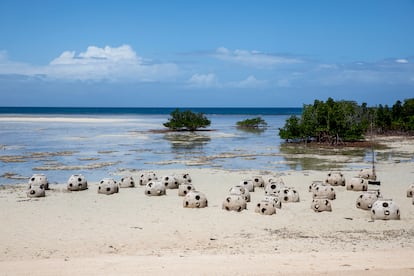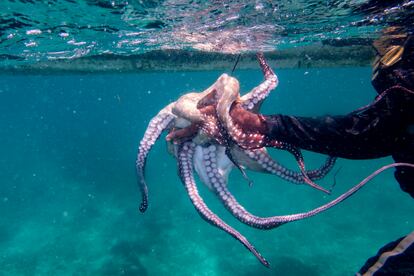A Tanzanian village saves reefs from blast fishing and global warming
Fishermen in the north of the country use concrete spheres to regenerate corals and protect the livelihoods of locals

In the village of Subutuni, in northern Tanzania, perforated concrete spheres emerge from the seaweed when the tide goes out in the late afternoon. Since 2008, the local fishing community and the Mwambao Coastal Community Initiative have been working on the construction and distribution of these artificial reefs, made by hand from limestone and concrete, and submerged in a designated no-fishing area. “The material we use is composed of a neutral pH,” says Steve Atwell, who works with Mwambao and is in charge of submerging the artificial reefs. “We want to create a base for the reef to grow back naturally.”
Ukasha Mlambo Kunema is involved in making the concrete spheres. The man runs his hand around the inside of the holes, while giving a couple of taps to the concrete to demonstrate its resilience. The hope is that, once submerged, the holes will not be hollow, but covered with coral plants, contributing to the marine health of the area. “We have submerged a total of 65 artificial reefs and are now putting the finishing touches to the next 30,” he says.

Mbwana Ishihaka has been volunteering for years with the Beach Management Unit in Subutuni, a village approximately 60 kilometers from the Kenyan border. Along with Kunema and his other colleagues, he believes that conserving reefs – one of the ecosystems most at risk from global climate change – is essential for the health of the planet, but also for business. “Many of us make our living from fishing,” he says, his eyes fixed on the sea. “If we don’t take care of the sea, there are no fish, and if there are no fish, we don’t make money. We must get involved in conservation for the sake of our own future.”
Next to him, Nasser Katane Mbraza strokes his fingertips, calloused from hard work. “I joined the volunteers because I realized that this place is being destroyed by foreigners and fishermen coming from other parts of the country,” he explains. “There are a lot of fishermen from Pemba Island and we don’t get any benefit.” Both he and Ishihaka agree that the future has to be local and that their volunteer work is beneficial for the community, making their livelihoods more sustainable. “We are proud of what we do because the community understands that it is good for everyone,” says Ishihaka.
The aim of local organizations is to show others how to take care of their waters. Several schools in Dar es Salaam and Arusha, such as the Moshi International School, are collaborating with the project. Mwambao and the fishing community also organize educational workshops for coral preservation. “We go out on the reef and collect damaged pieces of coral that, for the most part, can grow back,” adds Atwell.

A major challenge
According to the Center for Coastal Ocean Research and Development in the Indian Ocean (CORDIO), the corals of East Africa will be in danger of extinction within 50 years. Since the early 1980s, overfishing and blast fishing have become two of the main enemies of the reefs in Tanzania. The Pemba Channel, where Mwambao and the Subutuni fishing community work, is one of the most resilient areas to climate change on the East African coast due to the depth of its waters, but even so, experts say there’s no reason to be complacent.
In this region, there are frequent explosions using homemade bombs made from locally available materials. These explosions are carried out in shallow water and near live corals and mangroves. The result is severe damage to reefs, inhibiting the growth of new corals, destroying habitats, reducing the volume of fish and disrupting the food chain and ecosystem balance. “Blast fishing continues to be a common practice in the area. Those involved don’t care what the authorities say,” says Imani Rulazigula, who participates in community meetings organized by the Wildlife Conservation Society (WCS) in Moa, 14 kilometers from Subutuni . “But you can’t force people to stop. The change is within each one of us. Until then, the only thing we can do is to exert influence over our communities.”
Sign up for our weekly newsletter to get more English-language news coverage from EL PAÍS USA Edition
Tu suscripción se está usando en otro dispositivo
¿Quieres añadir otro usuario a tu suscripción?
Si continúas leyendo en este dispositivo, no se podrá leer en el otro.
FlechaTu suscripción se está usando en otro dispositivo y solo puedes acceder a EL PAÍS desde un dispositivo a la vez.
Si quieres compartir tu cuenta, cambia tu suscripción a la modalidad Premium, así podrás añadir otro usuario. Cada uno accederá con su propia cuenta de email, lo que os permitirá personalizar vuestra experiencia en EL PAÍS.
¿Tienes una suscripción de empresa? Accede aquí para contratar más cuentas.
En el caso de no saber quién está usando tu cuenta, te recomendamos cambiar tu contraseña aquí.
Si decides continuar compartiendo tu cuenta, este mensaje se mostrará en tu dispositivo y en el de la otra persona que está usando tu cuenta de forma indefinida, afectando a tu experiencia de lectura. Puedes consultar aquí los términos y condiciones de la suscripción digital.








































